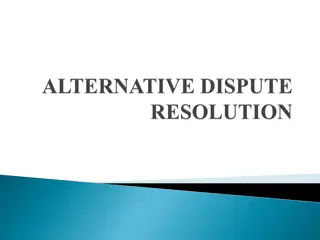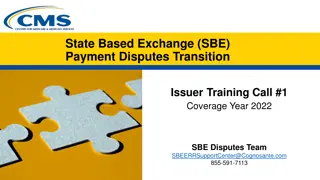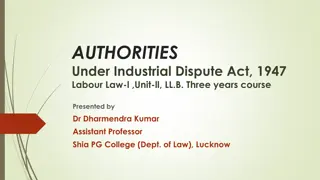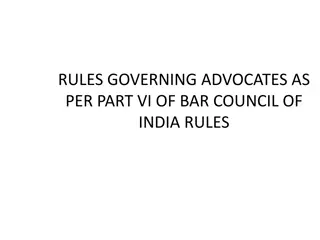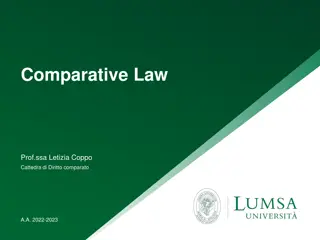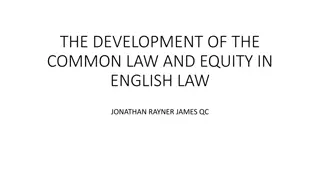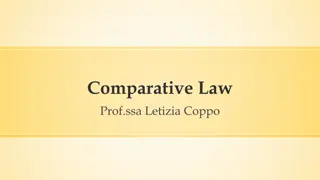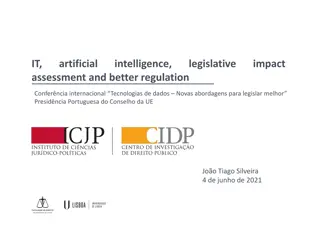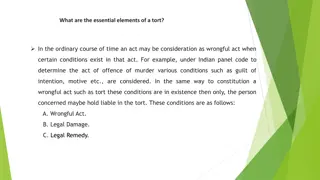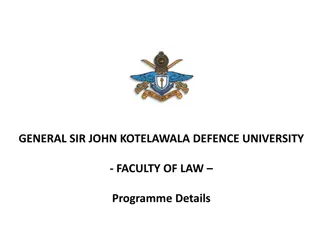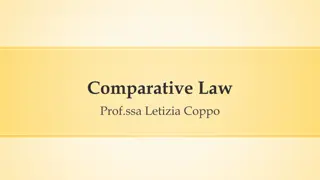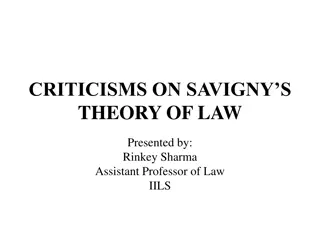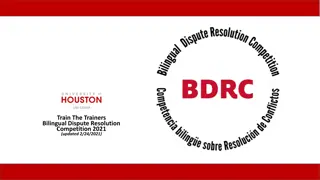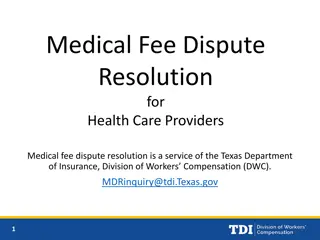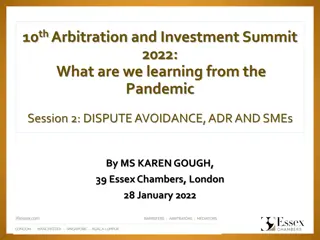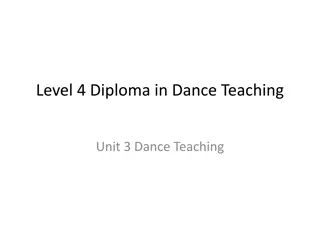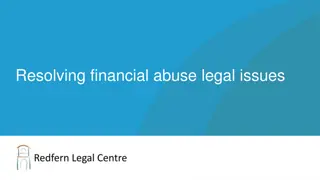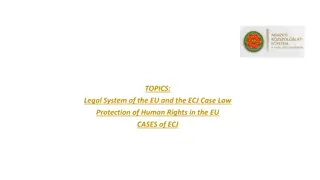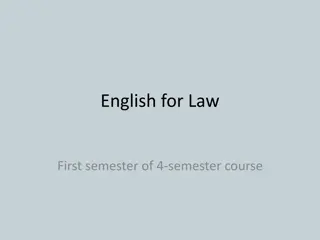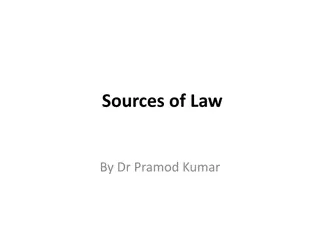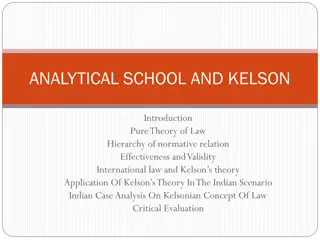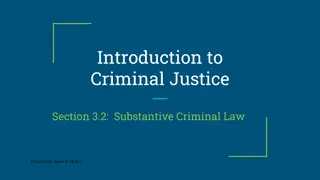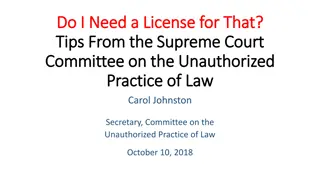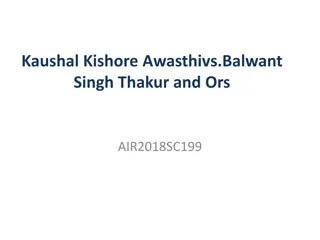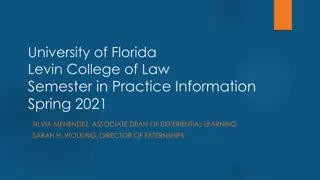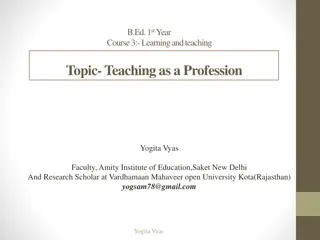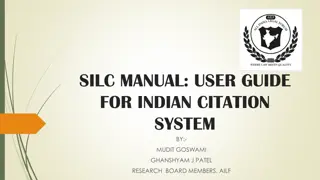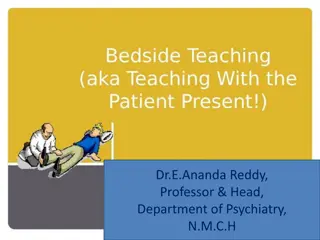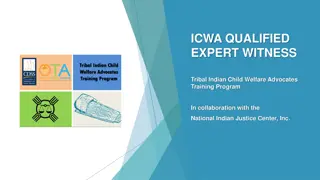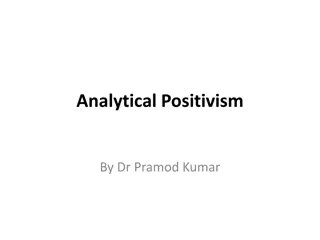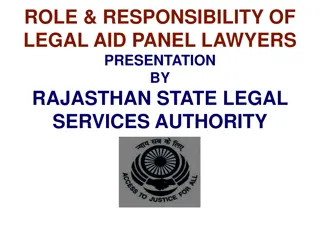Advocates' Right to Take up Law Teaching - Legal Dispute Overview
A legal dispute arose over whether full-time law faculty at the University of Delhi could enroll as advocates and practice law while continuing their teaching duties. The petitioners sought disciplinary action and enrollment cancelations, citing rules and regulations. The contentions focused on obligations to students and the rights of advocates to practice and teach law simultaneously.
Download Presentation

Please find below an Image/Link to download the presentation.
The content on the website is provided AS IS for your information and personal use only. It may not be sold, licensed, or shared on other websites without obtaining consent from the author. Download presentation by click this link. If you encounter any issues during the download, it is possible that the publisher has removed the file from their server.
E N D
Presentation Transcript
ADVOCATES RIGHT TO TAKE UP LAW TEACHING - AANCHAL
IMPORTANT PROVISIONS RULE 3 of Advocates Right to take up law Teaching Rules, 1979 Rule 49 of Chapter II of Section VII of BCI Rules Rule 103 of State Bar Council Resolution 108 of 1996 passed by the BCI Clause 5 of Ordinance XI of Delhi University
FACTS A writ petition was filed by the petitioners by way of PIL for a direction to respondent No. 1/Delhi University to take disciplinary action against all Full Time Law Teachers of the Delhi University, who were practicing in the courts and also praying for a direction to prohibit all Full Time Law Teachers of the Faculty of Law of the University of Delhi from carrying on legal practice/profession and also from appearing in the courts of law any manner. The petitioner had also sought for a direction to the Delhi State Bar Council, respondent No. 3 to cancel the enrolment/licence to practice given to Full Time Law Teachers. Another petition was filed by the petitioner, who was a Professor of Law the Faculty of Law, of the challenging the order passed by the BCI removing the name of the petitioner from the roll of Advocates of the Bar Council with a further direction that it would be open to the petitioner to make a fresh application for enrolment as an Advocate on his ceasing to be in employment.
ISSUE Whether a faculty member in the Faculty of Law, University of Delhi could subsequently enroll himself as an advocate and appear in a court of law and simultaneously carry on the duties of a full-time faculty member of the Faculty of Law, University of Delhi.
CONTENTIONS OF PARTIES The petitioners referred to various statutes and provisions prohibit teachers from practicing on courts and that by doing so, neglecting obligation towards the students. Respondents were all full time faculty members of the University of Delhi, who contended that as per Rule Advocates take up Law Teaching Rules 1979, they were entitled to practice in courts . which time full 3 of The to Right they are their
What is Rule 3 of The Advocates Right to take up Law Teaching Rules 1979 Notwithstanding anything to the contrary contained in any rule under this Act, an advocate may, while practising, take up teaching of law in any educational institution which is affiliated to a University within the meaning of the University Grants Commission Act, 1956, so long as the hours during which he is so engaged in the teaching of law do not exceed three hours a day.
Submissions of the BCI The counsel of the BCI referred to Rule 103 of the Delhi State Bar Council Rules which states that any any person, who is either in part time or full time service cannot be enrolled as an Advocate, whereas a part-time teacher of law could be admitted as an Advocate. He further submitted that Full Time Law Teachers could not have been enrolled as Advocates as provided for under rule 103 of the Delhi Bar Council Rules and that the 1979 Rule is a rule that operates post-enrolment and has no application to a person, who is not an Advocate. Resolution No. 108 of 1996 passed by the BCI disapproves the practice of enrolling full time salaried teachers in law, who were not enrolled as advocates at the time of their whole time appointment as teachers and direct all the Star Bar Councils to take immediate steps to initiate removal proceedings against such teachers. Clause 5 of Ordinance XI of Delhi University provides that a teacher shall devote his/her whole time to the service of the University and shall not, without the permission of the University, engage himself in other employment.
Observations of Delhi High Court If a writ petition is filed by a person driven by public interest and such a writ petitioner comes with clean heart, clean mind and clean objectives and is filed bona fide for the purpose of only serving a public interest, such a petition cannot be dismissed (K.R. Srinivas v. R.M. Premchand) The allegations of the full time Law teachers against the petitioners are based on surmises and conjecture. The petitioner has filed the present public interest litigation is an Advocate of this Court and is a responsible officer of the Court. The cause which is sought to be espoused is of public importance hence writ petition cannot be dismissed on the ground of maintainability.
In Rule 103 of Bar Council of Delhi Rules, it is provided that any person either in part-time or full time employment cannot be enrolled as an advocate but under the proviso is provided that a part-time teacher of Law could be admitted as an advocate. Therefore, under the aforesaid provision a part-time Law teacher could be enrolled as an advocate but no such privilege or benefit is available toa full time Law teacher. The 1979 Rules state that an advocate is empowered to take up law teaching provided the same does not exceed three hours a day. Therefore, the said rules clearly establish that the same are applicable and come into operation post enrollment and have no application to a person prior to his enrollment as an advocate. It was sought to be contended by all the law teachers that a person can combine law teaching and law practice simultaneously provided law teaching does not exceed three hours a day. It was submitted by them that after adaptation of the aforesaid rules, a lawyer could take up full time law teaching in regular scale of pay and, therefore, the converse is also possible therefore, a Law teacher could also be enrolled as an Advocate. Such an interpretation is not only fallacious & absurd.
Cont.. The court held that the obligation of the teaching faculty to the students cannot be ignored. There are several facts of teaching namely, delivering lectures, taking tutorials and seminars, doing research work etc. In order to give an exposure to the students undergoing the law course to acquire some practical experience, permission is granted to lawyers practicing in the Courts to undertake such law teaching provided such teaching does not take up more than three hours a day. Clause 5 of the Ordinance of DU provides that a full time teacher of the Delhi University is required to devote his time only to teaching and research in the University and, therefore, a full time teacher cannot undertake any other professional activity, such as practicing law as an advocate. The specific stand of the Delhi University that no full time teacher of the Delhi be he or she is in the Law Faculty or in any other Faculty of the University is not entitled to practice as a lawyer as long as he is a full time teacher in the University appears to be valid and reasonable.
The University Grants Commission had also informed the Registrar of the University that full time law teachers in University Departments and affiliated Law Colleges would not be permitted to enroll as members of the Bar but they should be allowed and permitted to appear in Courts for social action or PIL matters as well as legal aid/public interest litigation connected therewith but said permission is restricted. The Court also held that Rule 49 of Chapter II, (Standards of Professional Conduct and Etiquette) Section VII (Restrictions on other employments) of the BCI Rules which provides that an advocate shall not be a full time salaried employee of any person, government, firm corporation or concern, as long as he continues to practice, and shall, on taking up any such employment, intimate the fact to the Bar Council on whose roll his name appears and shall thereupon cease to practice as an advocate so long as he continues in such employment.
On the contention that the BCI could not take up removal proceedings against such full time salaried teachers of law who were subsequently enrolled as advocates as no such power could be exercised by the Bar Council of India and that also after expiry of about 20 years from the date of enrolment, Court referred to Satish Kumar Sharma v. Bar Council of Himachal Pradesh where it was held , the contention that the respondent could not have cancelled enrolment of the appellant almost after a decade and half and that the respondent was estopped from doing so on the principle of promissory estoppel, did not impress us for the simple reason that the appellant suffered threshold bar and was not eligible to be enrolled as an Advocate and his enrolment itself as clearly contrary to Rule 49 of the Rules in the light of the facts stated above. Hence neither the principles of equity not promissory estoppel will come to the aid of the appellant .
Conclusion The Court held that there can be no estopple against the statute, as held in Indira Bai v. Nand Kishore. Full time law teachers of the Law Faculty of the Delhi University could not have enrolled themselves as advocates and, therefore, enrolment given to the said teachers by the State Bar Council was per se void and illegal. However the court held that a part time teacher of law could be enrolled as an advocate and also that an advocate after being enrolled could take up part time law teaching. 1. 2. 3.


